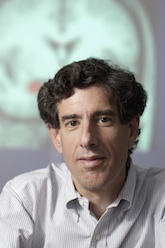
Richard J. Davidson is the William James and Vilas Research Professor of Psychology and Psychiatry, Director of the W.M. Keck Laboratory for Functional Brain Imaging and Behavior, the Laboratory for Affective Neuroscience and the Center for Investigating Healthy Minds, Waisman Center at the University of Wisconsin-Madison. He received his Ph.D. from Harvard University in Psychology and has been at Wisconsin since 1984. He has published more than 250 articles, many chapters and reviews and edited 13 books. He has been a member of the Mind and Life Institute’s Board of Directors since 1991. He is the recipient of numerous awards for his research including a National Institute of Mental Health Research Scientist Award, a MERIT Award from NIMH, an Established Investigator Award from the National Alliance for Research in Schizophrenia and Affective Disorders (NARSAD), a Distinguished Investigator Award from NARSAD, the William James Fellow Award from the American Psychological Society, and the Hilldale Award from the University of Wisconsin-Madison.
He was the Founding Co-Editor of the new American Psychological Association journal EMOTION and is Past-President of the Society for Research in Psychopathology and of the Society for Psychophysiological Research. He was the year 2000 recipient of the most distinguished award for science given by the American Psychological Association –the Distinguished Scientific Contribution Award. In 2003 he was elected to the American Academy of Arts and Sciences and in 2004 he was elected to the Wisconsin Academy of Sciences, Arts and Letters. He was named one of the 100 most influential people in the world by Time Magazine in 2006. In 2006 he was also awarded the first Mani Bhaumik Award by UCLA for advancing the understanding of the brain and conscious mind in healing. Madison Magazine named him Person of the Year in 2007.
A psychology podcast by David Van Nuys, Ph.D.
Podcast: Play in new window | Download
Subscribe: Apple Podcasts | RSS
I thought Richard’s comments about Binaural Frequencies were quite fair. As someone investigating these myself, I’m often annoyed by the bold sweeping claims (and even guarantees) made by some people and companies, such as help to quit smoking, and other baseless claims. Such claims so early on in our understanding really does Binaural Frequencies a disservice.
In my experience (and keep in mind that I’d consider myself an advocate of Binaural Frequencies), I’ve found the efficacy to be almost random, with many people feeling no discernible effect, others experiencing meditative-like bliss, and some people have bad physiological reactions. So far I have no real idea what common factors lies between these groups of people, and about the only thing I’ve noticed is those who react often have an “N – iNtuituve” typology. But I’m sure even in the coming months I’ll come across something that blows that idea out of the water! 😉
I have practiced meditation for many years. In my nursing practice I have also assisted others to relax and promote optimal mental states in order to navigate the challenge of illness.
I agree with Dr Davidson that one specific practice is not better than the rest. In fact, it may turn out that different combinations of practices may indeed be the answer, depending on the needs of the individual at any given time.
The key to the assessment of any practice really comes down to experiential results; to the ability of a practionner to achieve those desired brainwave patterns and nervous system response that induces deep relaxation and insight.
It is exciting to see that science is now merging with ancient wisdom to format a new view of how meditation can train the brain and promote greater health and well being.
I think that we are at the tip of the iceberg when it comes to understanding the benefits that complimentary practices like meditation have on the body, brain, and mind.
I really enjoyed listening to this episode. I find this topic particularly interesting and fascinating.
I would love to be consistent and stick with the daily practice of meditation but as Mr Davidson said is so challenging to keep that.
The benefits that each person can get with an active meditation are definitely worth it to try it and do it everyday. I\’m going to take the challenge and take responsibility to shape better my own brain.
Thank you Mr. Van Nuys for this interview.
Dr Dave! I graduated with a degree in Psychology from Sonoma State just a few years ago, but now find myself living close to Madison. And I also practice Tibetan meditation daily.
As it happens, I’ve met Dr. Davidson (Richie as everyone calls him) several times through a yoga center I work for. I had to laugh when you commented of being nervous around him – I still just cannot relax around him, because I am so in awe of him and what’s he’s doing for the scientific recognition of meditation. This despite the fact that I’m somewhat in the “inner circle” of his yoga friends, having recently paddled down the Wisconsin river in a Sunday gathering with a couple dozen others and he and his wife.
The most interesting thing I’d like to add here is that he and the Center for Investigating Healthy Minds are partnering with us to begin researching the effects of a new yoga program for people with Autism, called Spectrum Yoga Therapy, which is extremely exciting. This area may soon be another thing that he becomes known for if the data shows what we think it will.